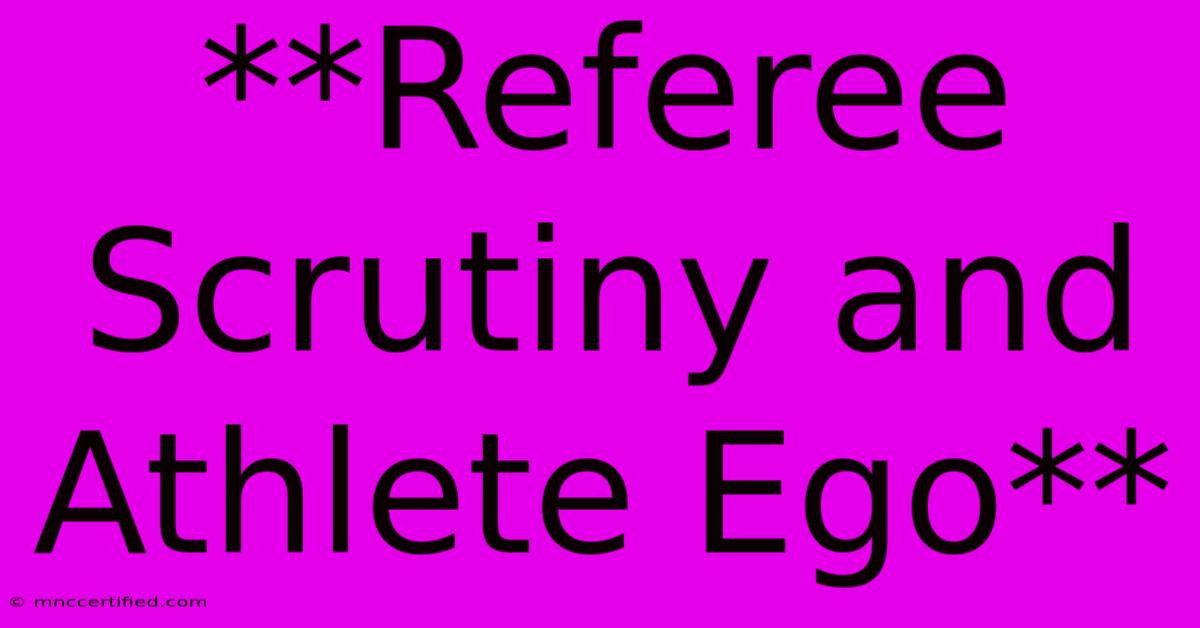**Referee Scrutiny And Athlete Ego**

Table of Contents
Referee Scrutiny: How it Fuels Athlete Ego and Impacts Performance
The roar of the crowd, the sweat on your brow, the adrenaline pumping through your veins – these are the defining elements of any competitive sport. But amidst the chaos and intensity, there's another force at play: the referee. Their role, seemingly simple, is crucial – ensuring fair play and upholding the rules of the game. However, the relationship between referees and athletes is often fraught with tension, particularly when it comes to athlete ego.
The Ego-Driven Athlete: A Recipe for Conflict?
Many athletes, driven by the relentless pursuit of victory, develop inflated egos. This can lead to a heightened sensitivity to perceived injustices, particularly when a referee's decisions go against them. The scrutiny of a referee's every call, the constant need to justify their actions, can easily fuel this ego.
Here's why this dynamic is problematic:
- Lack of Objectivity: A highly-developed ego can cloud an athlete's judgment, hindering their ability to objectively assess referee calls. This can result in unsportsmanlike conduct, like arguments and even physical altercations.
- Performance Decline: Constant frustration and anger stemming from perceived unfair officiating can significantly affect an athlete's focus and performance. Distraction from the game itself becomes a significant obstacle to success.
- Damaged Reputation: Outbursts and disrespectful behavior towards referees not only damage an athlete's reputation but also negatively impact the entire team's morale and performance.
The Referees' Perspective: Walking a Tightrope
Referees, too, operate under intense pressure. Their every decision is scrutinized, analyzed, and potentially criticized. The constant need to be impartial and accurate can create stress and anxiety. They are often caught in a no-win situation, criticized regardless of their call.
How this affects their interaction with athletes:
- Increased Sensitivity: Referees are more likely to feel threatened by an athlete's aggressive behavior, potentially leading to harsher penalties in an attempt to maintain control.
- Fear of Intimidation: The intimidating presence of a highly-egotistical athlete can influence the referee's decision-making process, potentially resulting in biased calls.
- Erosion of Trust: This cycle of tension and mistrust erodes the crucial foundation of trust necessary for a fair and respectful competition.
Finding Common Ground: Sportsmanship and Respect
The key to navigating this complex relationship lies in sportsmanship and respect.
- Athletes: By acknowledging the referee's authority, understanding their challenging role, and accepting decisions with grace, athletes can maintain composure and focus on their game.
- Referees: By remaining calm and impartial, ensuring consistency in their calls, and providing clear explanations for their decisions, referees can create a more respectful and productive environment.
Ultimately, fostering an environment where athletes and referees can operate with mutual respect and understanding is essential for the integrity and spirit of any sport. It's a delicate balancing act, but one that can create a truly positive and impactful experience for everyone involved.

Thank you for visiting our website wich cover about **Referee Scrutiny And Athlete Ego** . We hope the information provided has been useful to you. Feel free to contact us if you have any questions or need further assistance. See you next time and dont miss to bookmark.
Featured Posts
-
Stream Venezuela Brazil Qualifier Online
Nov 15, 2024
-
Cynthia Erivo Speaks Out Boldly
Nov 15, 2024
-
Best Glue To Bond Plastic To Metal
Nov 15, 2024
-
2024 Usa 1 0 Jamaica Post Game Analysis Espn
Nov 15, 2024
-
Eagles Hurts Scores On Brotherly Shove Play
Nov 15, 2024